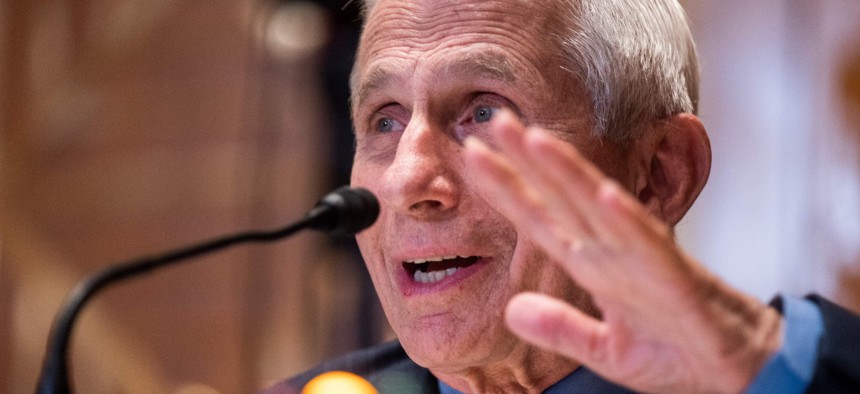
Fauci said he is moving to the next phase of his career and still has energy and passion for his field. SHAWN THEW/POOL/AFP via Getty Images
Dr. Fauci Will Leave Government, But Isn’t Retiring
“The United States of America is stronger, more resilient, and healthier because of him,” said President Biden.
Dr. Anthony Fauci, who has spent over five decades in the federal government and has been the face of the coronavirus pandemic response, announced on Monday he’s stepping down from his positions in December, but is not retiring.
Fauci, 81, will be leaving his positions as director of the National Institute of Allergy and Infectious Diseases, chief of the NIAID Laboratory of Immunoregulation and chief medical advisor to President Biden in order to “pursue the next chapter of my career” he said in a statement. Fauci has served under seven presidents––both Republican and Democratic––and was awarded the Presidential Medal of Freedom in 2008 for his work to advance treatment and understanding of HIV/AIDS. He became a household name when the COVID-19 pandemic started in early 2020 and amid praise he also faced calls to be fired, and personal threats.
“Over the past 38 years as NIAID director, I have had the enormous privilege of serving under and advising seven presidents of the United States, beginning with President Ronald Reagan, on newly emerging and re-emerging infectious disease threats including HIV/AIDS, West Nile virus, the anthrax attacks, pandemic influenza, various bird influenza threats, Ebola and Zika, among others, and, of course, most recently the COVID-19 pandemic,” said Fauci. “I am particularly proud to have served as the chief medical advisor to President Joe Biden since the very first day of his administration.”
Fauci stated specifically, “I am not retiring” now. “After more than 50 years of government service, I plan to pursue the next phase of my career while I still have so much energy and passion for my field,” Fauci continued. “I want to use what I have learned as NIAID director to continue to advance science and public health and to inspire and mentor the next generation of scientific leaders as they help prepare the world to face future infectious disease threats.” Fauci said he will assist with the transition over the coming months at NIAID.
“Because of Dr. Fauci’s many contributions to public health, lives here in the United States and around the world have been saved,” Biden said in a statement. “As he leaves his position in the U.S. government, I know the American people and the entire world will continue to benefit from Dr. Fauci’s expertise in whatever he does next. I extend my deepest thanks for his public service. The United States of America is stronger, more resilient, and healthier because of him.”
Health and Human Services Secretary Xavier Becerra said in a statement on Fauci’s departure “this is a decision we all knew would eventually come but hoped never would.”
Becerra continued: “When I arrived at HHS, the world was one year into the COVID-19 pandemic. I quickly came to rely on Dr. Fauci’s wisdom and counsel in our response, and along with his scientific acumen, I treasure his ability to break down complex science in simple terms to the American people to save lives.”
In an interview with The New York Times in January 2021 Fauci spoke about his contentious relationship with President Trump and his top officials during the pandemic and the challenges, including death threats, he faced.
"The people around him, his inner circle, were quite upset that I would dare publicly contradict the president," said Fauci.
Fauci told Government Executive in an interview this past February that misinformation and disinformation about the pandemic “has a very negative impact on anything we do,” especially when it comes to social media.
“You can prepare for a pandemic, you can get a vaccine that's highly effective and safe (the way the COVID-19 vaccines are), you can get an operation to make hundreds of millions, if not billions of doses, but if the disinformation campaign prevents people from taking it,” he noted, “that in many respects is a major, major obstacle in the optimal fulfillment of what the goal of the pandemic preparedness plan is: to protect the American people primarily, but then secondarily the rest of the world because the United States plays such a leadership role in every aspect of global health.”
It’s been known for a little while that Fauci was planning a career change. Fauci told Politico in July that he planned to step back from his positions by the end of President Biden’s first term. The media outlet reported this as Fauci planning to retire, but then Fauci clarified the next day that was incorrect.







